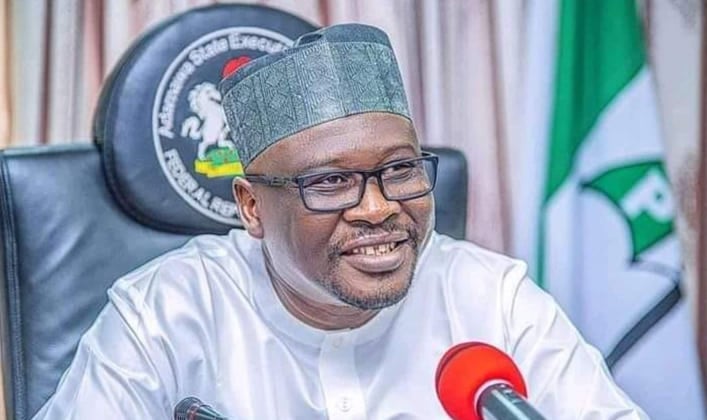In the year 2008, I co-edited a book with the title- African women can lead published by Kachifo Publishers under its prestige imprint. The book was a collection of essays and presentations made for three editions of the Development and Leadership Institute (DLI) Women in Politics and Leadership programme. We chose the book’s title after a rigorous debate by the advisory board of the programme. The thrust of the debate then was that more African women should be given a chance to lead as it will help address the prevalent inequality and empower women to contribute more to advancing society. Recent events where many Nigerian women are playing critical leadership roles globally on merit have made the book’s title a prophetic choice.
Particularly noteworthy is the recent assumption of the former finance minister of Nigeria, Ngozi Okonjo-Iweala, as the Director-General of the World Trade Organisation. This epochal event has again put Nigerian women in the spotlight – their impact on our society and how they can excel when given the opportunity. To be clear, Dr Okonjo-Iweala did not become the DG of WTO because she is a woman.
The fact that she and South Korean trade minister, Yoo Myung-hee, who were the last two remaining candidates for the WTO top job, happened to be women was merely incidental. The world was looking for a capable hand to lead global trade negotiations, and two women came up tops. So, the Nigerian economist and international development expert who was a two-time Nigerian finance minister, Managing Director of World Bank, and a board member of GAVI and Twitter, got the exalted position of DG of WTO wholly on merit.
Nigeria is a typical patriarchal society. Ours is a country that has never found a single woman competent to be elected to the chief executive of a state. The under-representation of women in political participation gained root due to the deep-rooted cultural practices inherent in our society, which has existed from the pre-colonial era to date.
However, the return to democratic rule in 1999 has witnessed an increase in women’s political participation in elective and appointive offices. By 2015, the national average of women’s political participation in Nigeria was 6.7 per cent in elective and appointive positions, which is far below the global average of 22.5 per cent, Africa regional average of 23.4 per cent and West African sub-regional average of 15 per cent.
Nigerian men hold primary power and predominate in political leadership roles, moral authority, social privilege, and property control. Most Nigerian traditional societies are also patrilineal, meaning that the male lineage inherits property and title.
Nigerian women face several challenges. Most critical is the cultural bias favouring male children, which has led to parents giving more support to male children above their female children. There is the problem of domestic violence. In some cultures, it is acceptable for a man to maltreat his wife purportedly as a discipline in Nigeria. Some Nigerian women are traumatised mentally, sexually, physically, and emotionally by their husbands, male counterparts, or partners. Our women have faced all manner of violence, from molestation, battery, physical attacks, wife-beating, corporal punishment to rape.
There are also female child labour, abortion, prostitution, and female genital mutilation problems confronting and potentially limiting the Nigerian woman. There is the hydra-headed problem of child marriage. According to official statistics, 43% of Nigerian girls become married before their 18th birthday and 17% before turning 15. This problem is most prevalent in the northern part of the country. These challenges have not stopped women from playing roles or making impact as leaders.
There are some primary attributes of women which are essential in leadership. These are what Nigeria as a country loses as we have refused to give our women ample opportunity to thrive and contribute their quota to national development. The likes of Dr Okonjo-Iweala, Amina J. Mohammed, Folorunsho Alakija, Chimamanda Ngozi Adichie, Agbani Darego, Genevieve Nnaji and Funke Akindele demonstrate visionary leadership and steadfast dedication to work and achieve great results that enabled them to rise to the pinnacle of their professions. Activist Funmilayo Ransome-Kuti, the late Professor Dora Akunyili and committed physician, the late Ameyo Adadevoh, all had these qualities before they left for the great beyond.
It has been said that women handle crises better than men. One may argue that childbearing makes them compassionate and patient as it requires patience to carry a pregnancy for nine months and compassion to deal with little children. A crisis-torn country like Nigeria needs these attributes. They also show greater empathy than men. Insouciance is not gendered specific, but one can argue that we have more hard-hearted men in our society than women.
Women are great leaders because studies and experience have shown that they bring unique perspectives from different emotional, cultural, and structural dimensions to drive effective solutions to society’s challenges. They are better than men in balancing professional and personal leadership skills. They exhibit high emotional intelligence, often flexible and lead by example – essential qualities needed in today’s Nigeria. They listen well, and dealing with children probably makes them better communicators and better at nurturing people than the menfolk.
Handling the home complications makes our women good at multitasking, an attribute needed in Nigeria’s complex socio-economic environment. Women work better in teams. They prove this by the seamless manner they organise events as we have more women than men as event planners in Nigeria. In Nigeria’s political, social, and economic environment, teamwork is a sine qua non for success.
Our women dream big. They are motivated by challenges. A woman who can defy the odds and rise to the top of her profession in our patriarchal society with inherent anti-women biases is capable of being a great leader.
In today’s Nigeria, women are grossly underrepresented in politics and other sectors of our body polity. Just three per cent of people elected to public office in 2003 were women. By 2007 that figure increased to about seven per cent, but in 2015, the numbers declined to 5.6 per cent. Before the 2019 elections, women’s representation in the House of Representatives was 5.5%; the Senate was 5.8%.
The statistics in more developed societies tell better stories for the womenfolk. In the United Kingdom, 19.4 per cent of Members of Parliament and 30.8 per cent of local councillors are women. Simultaneously, in the United States, 12 per cent of governors and 17 per cent of the mayors of the 100 largest American cities are women. America just elected a female Vice President. These numbers may not be ideal, but they are at least encouraging. These results reflect two important facts: a conscious and deliberate programme to have more women play leadership role as seen in countries like Rwanda, New Zealand and Iceland or political evolution leading to appreciation of the value women can bring to leadership as seen in the United States.
In other sectors of America, women fare a lot better. In the US, women are 50.8 per cent of the total population, but they earn almost 60 per cent of undergraduate degrees and 60 per cent of all master’s degrees. They do reasonably well in law, medical degrees, business administration and management. Women account for 47 per cent of the US labour force and 49 per cent of the college-educated workforce. They account for 52 per cent of the professional-level and middle-management jobs, 45 per cent of associates in the legal field and the medical sector and comprise 35.5 per cent of all physicians.
The reality is that any society, institution, or organisation presently cannot function effectively without women’s substantial participation in leadership activities. Many statistics show that companies led by women have better financial results. Leadership by women is vital to increase the pace of societal transformation at home and in the workplace. Women create a perspective that brings competition and collaboration to organisations and teams.
Gender realignment in leadership is crucial because more remarkable progress is only made with a diversity of leadership roles. Concerted efforts should be made by the government and non-governmental organisations to increase women’s participation in all facets of our life in line with the declaration made at the fourth World Conference on women in Beijing, which advocated 30% affirmative action.
The country can make better progress if the extant National Gender Policy (NGP), which recommended that at least 35% of both elective political and appointive public service positions be reserved for women, is implemented. There should be social reorientation which would emphasise the crucial role women play in leadership. All policies and practices, which limit women’s ability to reach a peak in politics and business, should be discarded. It is only in this way that we can give more Ngozi Okonjo-Iwealas to the world.
Advertisement






